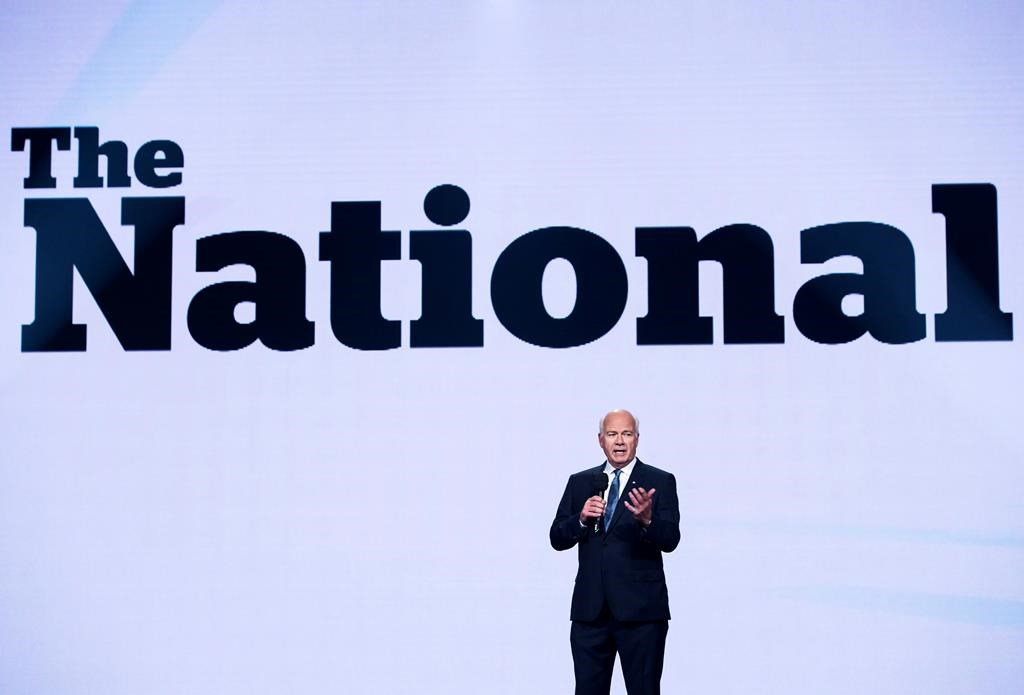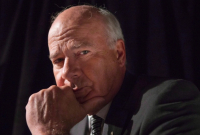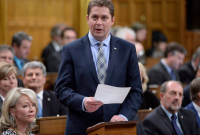Support strong Canadian climate journalism for 2025
Peter Mansbridge doesn’t want to make a fuss about leaving the anchor’s chair at CBC’s "The National."
Nearly a year after telling viewers he planned to retire from the public broadcaster’s flagship program, the 68−year−old newsman who defined an era at CBC News plans to sign−off for the final time with little fanfare.
"Don’t expect much," he said in a recent interview. "I’ve never wanted it to be about me, this program."
As Canada’s 150th celebration nears on Saturday, so does Mansbridge’s chosen date to say goodbye. The procession begins Wednesday night when he delivers his final broadcast of "The National" from the CBC’s Toronto studio.
Carole MacNeil helms Thursday’s show, which will pay tribute to Mansbridge’s 50−year career, including almost 30 years as "The National" anchor. He’ll then return to the newscast one last time on Friday from Ottawa, before leading the CBC’s Canada Day broadcast at Parliament Hill.
"I’ve always taken most of the summer off anyway, so it seemed like a good exit point," he said.
Mansbridge’s storied journalism career was launched at 19 thanks to a stroke of luck. He was plucked from an airport cargo job in Churchill, Man., after a CBC Radio manager heard his broadcast−ready voice over an intercom system.
Mansbridge was hired for a late−night spot on the local radio station and within a few years worked his way up to become a TV reporter. He moved to Ottawa as a parliamentary correspondent in 1976 and occasionally sat in for Knowlton Nash on "The National." By 1988, Nash decided to step away from anchoring the broadcast to ensure Mansbridge didn’t leave the network for a job on a CBS morning show.
In addition to interviewing world leaders like former British prime minister Margaret Thatcher and then−U.S. president Barack Obama, Mansbridge was known for a calm, authoritative tone during monumental live news events including the terrorist attacks of Sept. 11, the counting of votes for the 1995 Quebec referendum, and the funeral for Princess Diana.
Throughout his time at the CBC, Mansbridge amassed little pieces of history — rocks, soil and other "sentimental" items from his travels. He’s kept pebbles from a visit to the Battle of Dieppe site in France, dirt from Vimy Ridge, and sand from the beaches at Normandy.
"Some of them I put into a fireplace that (my wife) Cynthia and I built in our house in Stratford," Mansbridge said. "Obviously I’ve got pictures — and lots of them — but this was a more tangible thing. I can reach out and touch a part of the Berlin Wall and the Great Wall of China."
His tenure was not without controversy, including criticism for a paid speech at a conference for petroleum producers. Others said his interviews with Canadian prime ministers, world leaders — and former embattled Toronto mayor Rob Ford — were too softball.
When a refreshed version of "The National" debuts on Oct. 30 it will feature multiple anchors. Mansbridge’s advice?
"You’ve got to ensure the people you choose have defined roles and they respect each other’s defined roles, or it can get awkward for everybody," he said, adding that a dramatically changed format could turn off loyal viewers.
"If you take them out of their comfort zone ... there’s a risk," Mansbridge said. "You have to be careful to be sure you’re not alienating your core audience while you’re trying to attract a new audience."
Mansbridge was happy to embrace experiments with new technologies. Earlier this year he began holding Facebook Live chats with viewers during commercial breaks on "The National" and dabbled in 360−degree VR technology by hosting a YouTube documentary inside the tunnels of Vimy.
Asked what other changes he thinks "The National" should undergo, Mansbridge returns to an opinion he’s held for years: cut back on commercials.
"It’s ridiculous we have to break for as much time as we do every night," he said. "We say we have a one−hour program — it’s not an hour. You take the commercials out it’s (about 43 minutes). That’s unfortunate. It takes away time from what we could be doing with those kind of minutes."
Mansbridge isn’t leaving news entirely and has already spoken to the CBC about working on a "freelance" basis, although he remains cagey on exactly what that means. He’s expressed some interest in long−form documentary projects and has said in the past he’d like to lend more time to good−news features.
"They’ve made a number of proposals to me," he said of the network. "I’m going to take the summer to make a decision. It’ll be something totally different than everything I’ve ever done before. It’ll certainly be in the field of journalism but it won’t be daily and it won’t be an interview show."
He said the whole idea of retiring from "The National" was to work fewer hours each week. He’d like to keep that pledge.
"Everybody — well, not everybody — but a lot of people want a piece of me now," he said. "I’m going to resist that temptation."





Comments